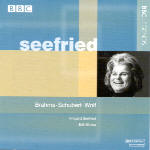Irmgard Seefried was one of the bright lights of the opera and recital stages of the 1950s. Her silvery lyric soprano was blessed with depth and texture and her vocal equipment was joined to perceptive interpretive skills that illuminated her operatic roles and lieder singing. Here she’s heard with her longtime accompanist Erik Werba in BBC broadcast tapes made in January, 1962, and in a charming brief broadcast interview from 1965.
The Brahms is slightly marred by an occasional vocal graininess, but that’s just a minor blip. She sings the folksongs without the heavyhandedness that can make them a trial–no cute elbow-nudging or stomping rhythms here. In the other Brahms songs and indeed, throughout the disc, Seefried colors her voice to give each song an individual flavor, lightening it for the joyful Ständchen, darkening it with grief for Es träumte mir. Her phrasing also is a thing of wonder, perfectly tracing the arching melody of Unbewegte laue Luft, for example.
The Schubert and Wolf songs were taped the next day. The grain is now gone, the voice freer and unclouded. The songs are all derived from Goethe’s Wilhelm Meister and Faust. Again, Seefried’s tonal colorings and verbal sensitivity make each song a gem. She sheds vibrato to give Gretchen’s hothouse spinning song a hypnotic quality, and heightens the intensity of her voice to suit Wolf’s more harmonically complex Mignon. Each song is a delight, and Seefried’s myriad felicities of phrasing and vocal coloring never draw undue attention to themselves or break the line. All is in service to the music.
The mono sound is acceptable, though Werba’s accompaniments could have greater presence. But what could the BBC’s producers, like others of their ilk in the industry, be thinking of when they issue a disc of 23 songs without texts or translations?
































